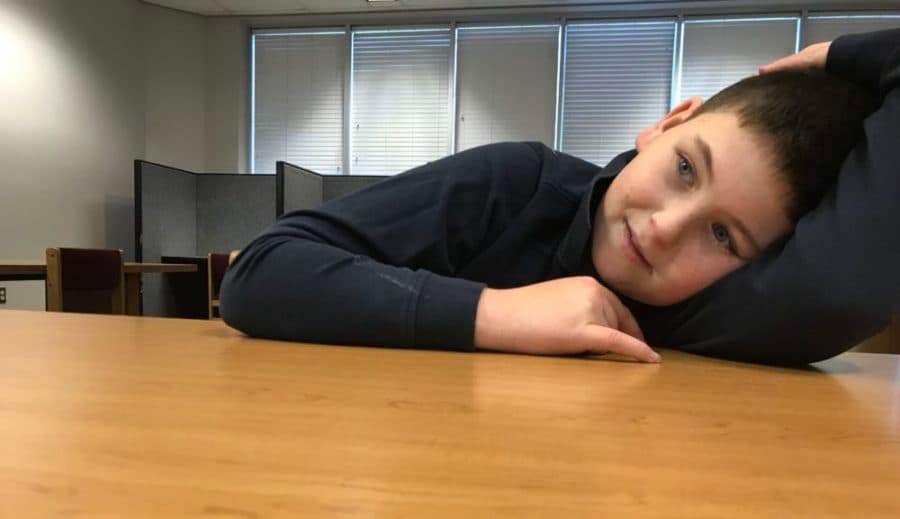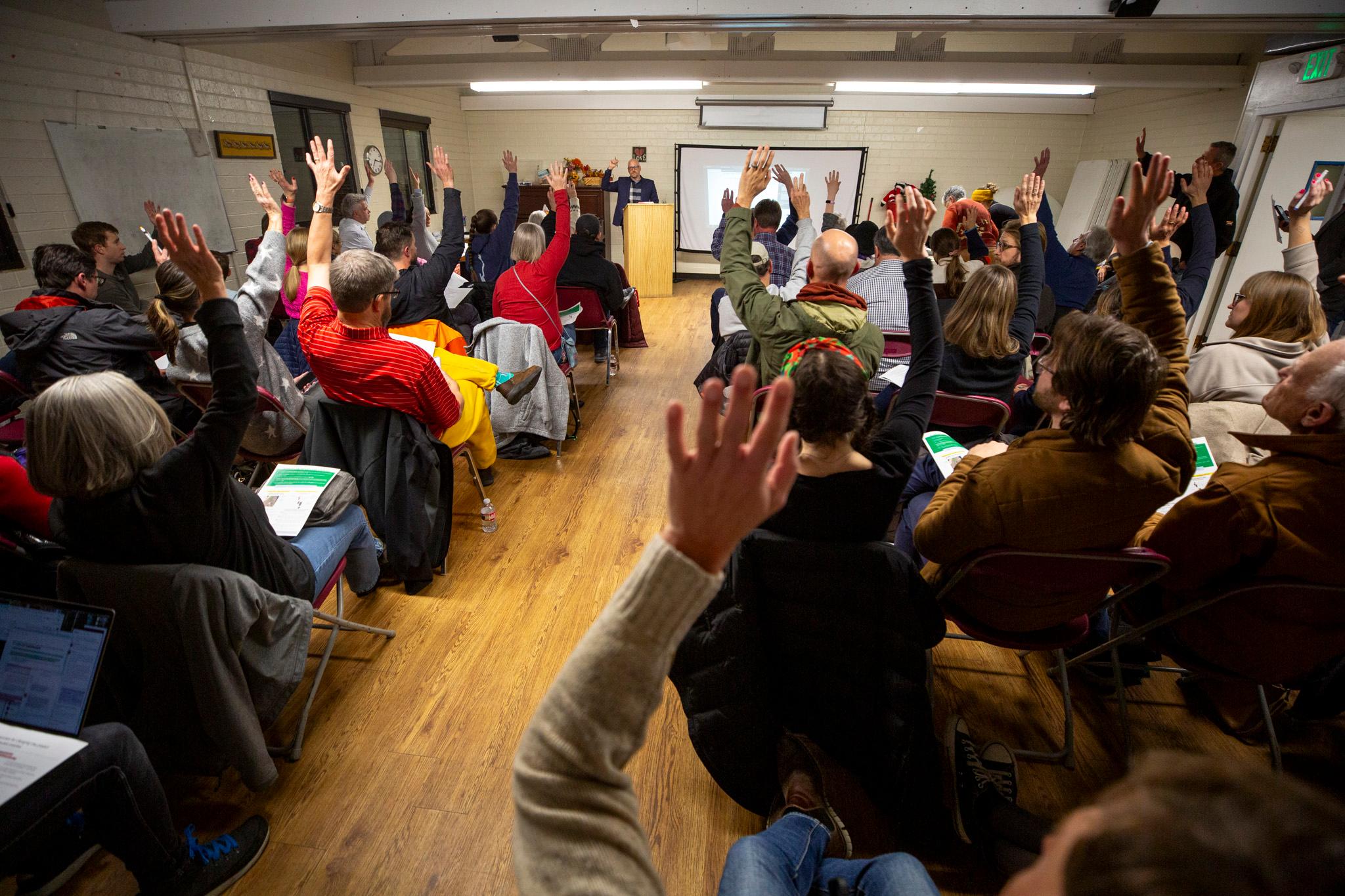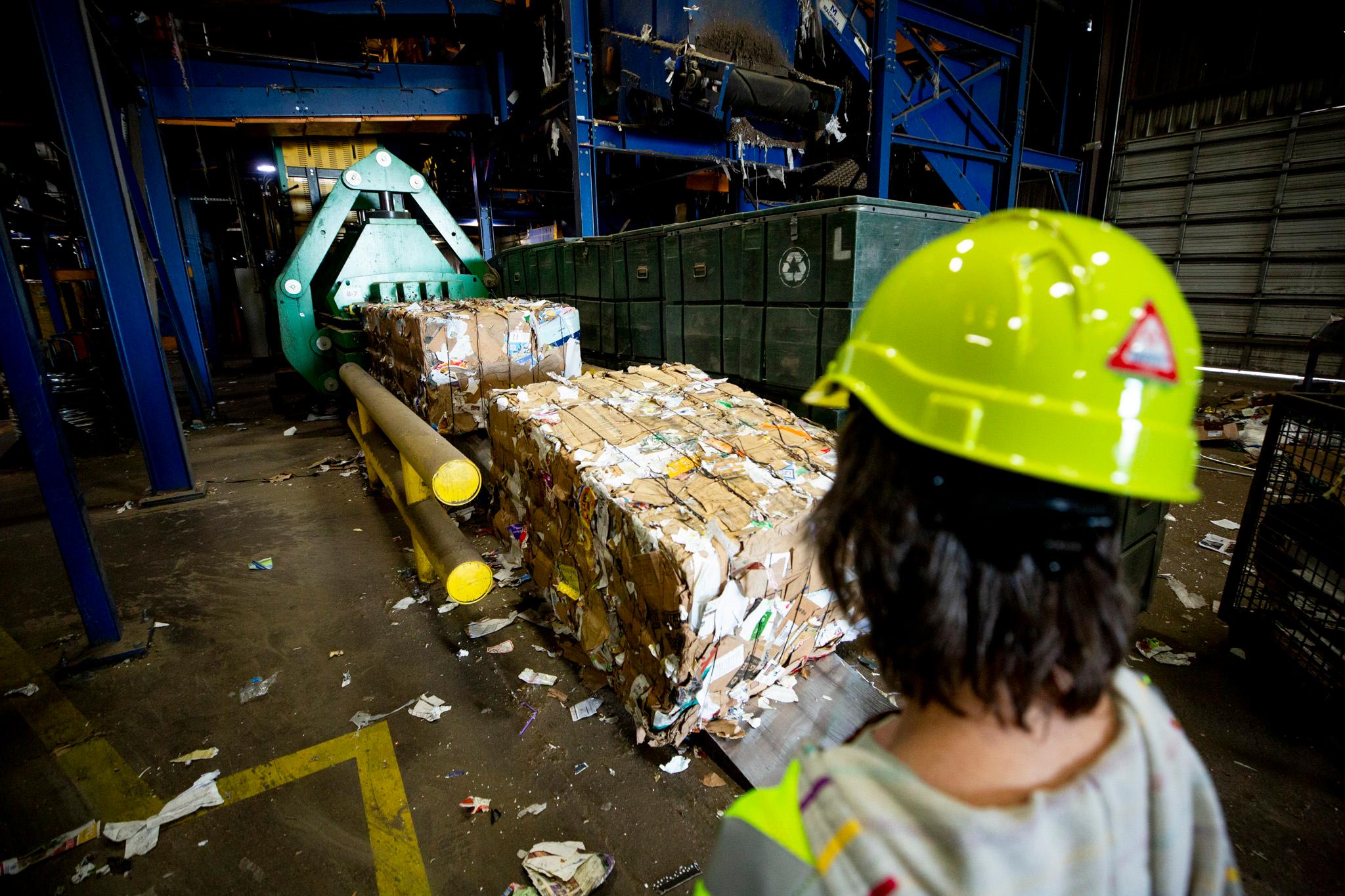Jake DiProfio was handcuffed at school four times this year. He's 11 years old.
The experience left him with nightmares, scars on his wrists, and a visceral fear of police. Seated at his kitchen table in southeast Denver this month, the fifth-grader excused himself to his room before talking about it. He came back with a painted wooden box that looked like a small treasure chest. Inside was his rock collection, a handful of smooth stones his parents bought for him at the science museum. He fiddled with them as he spoke.
"Usually, I don't remember it," he said about being handcuffed. "It comes back over a week."
Those memories, he said, turn into nightmares that last a lot longer.
"Like two nights ago," he said, turning a quartz over and over in his hand, "I couldn't sleep because whenever I shut my eyes, I saw the cuffs -- me, in a chair with cuffs on."
The issue of handcuffing in Denver schools rose to prominence last month when a different family spoke out about it happening to their 7-year-old son. At the time, Denver Public Schools said its campus safety officers had handcuffed students 58 times in the past two years. From May 1 to May 28, seven more students were handcuffed, a district spokesperson said.
The Denver school board is now rethinking its policy. A proposed resolution would ban the use of handcuffs on elementary school students, with one exception: fourth- and fifth-graders who pose "an imminent and probable threat of serious bodily injury to self and others."
The school board delayed voting on the resolution earlier this month to allow families to weigh in. Superintendent Susana Cordova said she's committed to changing district practice regardless of the vote. Cordova, who took the top job in January, said she didn't realize until recently that elementary school students were being handcuffed.
"I understand the concerns that parents are raising about this," she said, "and I'm deeply committed to moving forward with a different way of handling this."
But the proposed exception for fourth- and fifth-graders could still allow students like Jake to be handcuffed.
Jake has a disability that his father describes as a developmental delay in the ability to deal with frustration. A lot of the time, Jake acts like a typical 11-year-old who loves video games, riding his bike, and trying to stump people with riddles.
But if he encounters a perceived injustice, an unexpected schedule change, or an instruction to do an activity he doesn't like, his behavior can become explosive. Trying to calm him by putting your hands on him only makes it worse, said his father, Will DiProfio. Instead of processing the calming attempt as a typical child would, Jake's response is fight-or-flight.
"In his brain," Will DiProfio said, "he's fighting for his life."
Young students affected
Denver Public Schools does not comment on individual cases. It also does not track the age, race, or disability status of the students who are handcuffed, which is a problem because it doesn't allow the district -- or the community -- to see whether there are disparities.
But anecdotal evidence suggests Jake's story isn't unique.
Pam Bisceglia, the executive director of Advocacy Denver, an organization that supports people with disabilities, for years has heard stories of elementary school students with disabilities being handcuffed by Denver Public Schools campus safety officers.
The district employs more than 100 campus safety officers, who can start work with as little as 4½ weeks of training. While they can't arrest students, a few dozen more highly trained officers are armed with guns. The rest carry pepper spray and handcuffs. In addition to their initial training, officers must attend at least 40 hours of refresher training each year.
District policy says campus safety officers can only handcuff students under certain conditions allowable by state law: when a student is openly displaying a deadly weapon, or when a trained officer has made a referral to law enforcement.
District spokesperson Anna Alejo said referrals to law enforcement mean a school is calling the police because there has been a potential crime or violation of the discipline code.
But advocates said handcuffs still get used in cases that don't meet that bar. And district officials confirmed that handcuffs are not solely used in response to criminal activity.
"Sometimes students are in significant crisis and act in a manner that is a danger to themselves or others," district officials wrote in response to questions from Chalkbeat.
While campus safety officers use "as many tools as possible to de-escalate," district officials wrote, handcuffs may be used in an emergency "to protect that student (or others) until Denver police arrive to evaluate the need for a mental health evaluation."
Jennifer Levin, an attorney with Disability Law Colorado, the state's designated advocate for people with disabilities under federal law, has looked into the handcuffing issue. She said she told Denver Public Schools that even if its actions were legal, they were inappropriate.
The youngest student Bisceglia knows about who was handcuffed was 3 years old. The child had autism, she said, and the stress of being separated from family members for preschool would sometimes cause the child to cry and throw a tantrum. One day, after unsuccessfully trying to calm the child, the classroom teacher called campus security officers.
The officers ended up handcuffing the child, Bisceglia said. Because the child's wrists were so tiny, she said the officers put the cuffs around the 3-year-old's biceps.
The campus security officer involved in that incident was fired, according to the district.
The first time Jake was handcuffed, he was 6 years old. His mother, Melanie DiProfio, remembers getting a call from Denver's Carson Elementary School, explaining that Jake was upset, tipping over desks and chairs, and the staff couldn't get him to stop.
She said she rushed to the school. By the time she got there, Jake was totally calm. He was also in handcuffs.
"I was like, 'This must be what they need to do. This must be the system,'" Melanie DiProfio said. "I'm not a protester. I'm trying to work with them."
But now, she said she wishes she would have spoken out sooner.
"Maybe things would be different," she said. "I sometimes feel I haven't done enough for Jake."
Four times in a year
Jake started this year as a fifth-grader at Denver's Bill Roberts K-8 School. He was assigned to an "affective needs center," which is a separate classroom for students with emotional challenges. By his mother's count, it was the ninth school program for the 11-year-old, who has received special education services since he was in preschool at age 3.
The year began fine. But by the end of September, Jake had been handcuffed twice -- something that hadn't happened in five years. He was handcuffed a third time in March and a fourth in April before his parents pulled him out of school for the remainder of the year.
According to incident reports written by district staff, provided to Jake's parents and reviewed by Chalkbeat, the four incidents started similarly: Jake refused to do something - clean up his breakfast or complete a writing assignment -- and things escalated from there.
Jake's refusal turned physical, the reports say, with him throwing a notebook or running out of the room. Once, he kicked a book that a teacher was holding, giving her a bloody nose. He sometimes started singing loudly, which his parents said he does when he's agitated.
Eventually, his teachers called campus security. When Jake saw the officer, he fought back with kicks and punches. More than once, he grabbed the lanyard around the officer's neck.
The officer often called for backup from the district's armed patrol officers. One report notes that when an armed officer showed up, Jake started screaming, "He's going to kill me!"
That same report says that in addition to handcuffs, the officer used two pain compliance techniques to try to control Jake, including the "mandibular angle" technique, which involves pressing a pressure point behind the ear that causes pain but leaves no injury. District officials said officers are trained in these techniques and must be recertified every two years.
"This technique was unsuccessful," the report notes.
After that incident, the school called Jake's father, as it usually did. When he showed up, Will DiProfio said his son was sitting backward in a chair, draped in his favorite blanket, with three officers surrounding him. He had a blank expression on his face and was drooling. On the drive home, Will DiProfio said Jake started shaking and wouldn't heed his calls to snap out of it. Fearful his son was having a seizure, he changed course and drove to the emergency room.
The doctors couldn't figure out what was wrong. When Jake came to in a hospital bed, with an IV in his arm, Will DiProfio said he asked his son what happened.
"He said, 'I fell asleep and I was dreaming about Carson,'" Will DiProfio said. "That's when the lightbulb went on." He began to suspect his son had PTSD from being handcuffed.
"It's not about the physical injuries that are happening during these escalations and these restraints," Will DiProfio said. "It's about the invisible injuries that are happening whenever you put a developing mind in handcuffs. I didn't see that until this year."
The report notes that Jake's father took him to the hospital. It does not say whether the incident was reviewed by the district's "force review board," which only reviews handcuffing incidents if there is a complaint -- a policy the school board is considering changing. Superintendent Cordova said she is also pushing the district to collect and share more data about handcuffing incidents as a way of "honestly assessing how well we do" at following that policy.
Lasting trauma
Jake's parents do not dispute that his behavior can be challenging -- and even dangerous. Will DiProfio said he does not fault the staff at Bill Roberts K-8 School, several of whom formed genuine connections with Jake and are still advocating on his behalf.
Advocates don't necessarily blame the campus safety officers, either. As Levin, the attorney, said, "They're coming in and doing their job." Instead, everyone agrees that district staff, including teachers, need more training in how to prevent students from becoming frustrated and exhibiting challenging behavior, how to de-escalate them when they do, and how to determine which situations require intervention by safety officers and which do not.
"What I saw was happening was officers were being called in by the teachers, I think because the teachers didn't want to physically restrain these students -- maybe out of fear of getting hurt, or hurting students, or because they didn't want to get in trouble," Levin said.
Bisceglia added, "Sometimes we will hear from schools that, 'Our policy is we don't put hands on kids.' So they rely on safety and security [officers] to put hands on students. And we have concerns with that. We want school staff to have the appropriate tools."
Best practices include evacuating the room where a student is acting aggressively and waiting until the child calms down, Bisceglia said. That technique worked for Jake in the past, his parents said, and he much prefers it to being physically restrained.
The resolution under consideration by the school board would require campus safety officers to undergo five additional days of training, including in de-escalation techniques, the use of physical holds, and what constitutes an emergency. It would not require teachers to undergo additional training, though Cordova said the district is exploring that, along with hiring more staff to work in high-needs schools.
Jake has been out of school since April. The district is providing him an hour of one-on-one tutoring three times per week at a local public library. It's a temporary solution agreed upon by his parents and his special education team, until he can start at a new middle school this fall.
On a recent Friday, Jake zipped through a worksheet on plate tectonics and listened to his teacher read a chapter from a fantasy novel. He squirmed in his seat, put his head down on the table, and hummed quietly. But he was paying close attention, giggling at the funny parts and shouting, "Told you!" when a plot twist he predicted came true.
He and his teacher closed out the hour at the library's chess board, tucked in a corner nook by the front doors. The game ended in a draw. Usually, Jake wins.
Jake enjoys the tutoring, and his parents hope he can continue throughout the summer. Jake is not looking forward to going back to school in the fall. Being handcuffed, he said, has made him scared. The 11-year-old speaks eloquently about the painful effects it has had on him and on other students with disabilities like his.
"When this happens, we cannot control ourselves," he said. "We're getting trauma for having something that we did not ask for. We did not ask to have this developmental delay or whatever diagnosis it is. We didn't ask for this, so people, stop treating us like you don't care.
"I do not deserve to be handcuffed. I do not deserve that. I deserve a lot more."
Chalkbeat is a nonprofit news site covering educational change in public schools.













